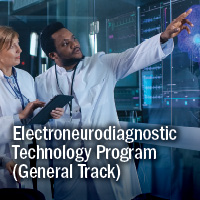Electroneurodiagnostic Technology


Electroneurodiagnostic Technology (END) is a scientific field devoted to the recording and study of electrical activity in the brain and nervous system. Technologists record electrical activity arising from the brain, spinal cord, peripheral nerves, somatosensory or motor nerve systems using a variety of techniques and instruments.
END technologists understand neurophysiology, and recognize normal and abnormal electrical activity. They act as eyes and ears for specially trained doctors who later review and interpret the data. Considerable individual initiative, reasoning skill and sound judgment are all expected of an END professional.
Tasks may include:
- preparing patients for procedure
- obtaining medical histories
- recording electrical potentials
- calculating results
- maintaining equipment
- working with specific treatments
- developing good rapport with patients and comforting them during the recording procedure, which can last from 20 minutes to eight hours.

